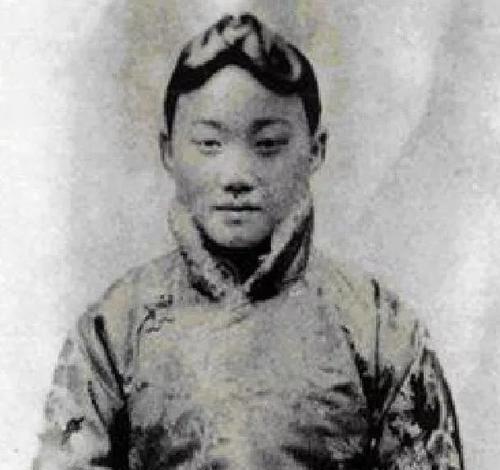Dou'e is an artistic image in China, but it vividly shows the real situation of ancient women being exploited by feudal society. After the appearance of such an artistic image of Dou'e, it has left a deep imprint in the minds of ordinary people. In the Republic of China period, there was a strange woman, because of her legendary experience in the first half of her life, and Dou E in "Dou E'er", she had several similarities.
This strange woman is Li Shuqing, and many information about her is recorded in the "Chronicle of Qiucheng". According to the Records of Qiucheng, Li Shuqing, whose original names were Yuanbao and Shuzhen, and the character Wenhua, changed her name to Liu Yi after marrying Liu Gong, and was nicknamed Zheng Qingzi. She was born in the eighteenth year of Guangxu, that is, in 1892, in Longjiawan, Xiaguan Street, Qiucheng (now Xiantao City), Hubei Province.

Li Shuqing was originally from Guangdong, her father was a low-level bureaucrat in Qiucheng, died in the war, her mother Xie grew up by doing needlework to pull her, and later Li Shuqing changed her name to Liu Yi after marrying Liu Gong.
According to the "Meichuan Diary" written by Ju Zheng, a veteran figure of the League, the Communist Progressive Association and the Kuomintang, Liu Yi was smart, beautiful, and good at communication from an early age and was deeply loved by the students of the new school in Qiuyang.
At that time, the students of the New Style Academy in Qiuyang liked to drink tea and chat in Liu Yi's house, and Liu Yi's mother relied on these tea money to make a living. Liu Yi is not only beautiful, but also very good at communication, so he has some fame in the local area.
At that time, the director of the Qiuyang Persuasion School, equivalent to the current director of the Education Bureau, spent a lot of money on Liu Yi, and naturally Liu Yi's first time was naturally given to the director of the Qiuyang Persuasion School. At that time, the director of the Qiuyang Persuasion School often stayed in the teahouse, and when he looked at Liu Yi, he refused to leave, and many people gave Liu Yi the nickname of "Qiuyang Supervisor" to tease her.
As early as Liu Yi was very young, he was promised by his family to sell roast beef to Ding Hui merchants. Later, after the two got married, Liu Yi was still debauched, and her husband Ding Mou died inexplicably not long ago. This matter also caused great controversy at that time, and Ding's family sued Liu Yi to the county court, believing that Liu Yi killed Ding.
Later, Liu Yi was rescued by shusheng students, including zhixian's son, and the director of the Qiuyang Persuasion School, and she was spared the death penalty. Liu Yi was finally sentenced to an official price of 24 yuan and assigned Liu Yidangtang to a wealthy merchant surnamed Wang.
The rich merchant surnamed Wang was very fond of Liu Yi, but this caused strong dissatisfaction from Mrs. Zhengfang. Mrs. Zhengfang's jealousy grew, and it wasn't long before Mrs. Zhengfang poisoned Liu Yi in the bean juice, originally wanting to poison Liu Yi. Whoever thought about it was mistakenly drunk by a rich merchant surnamed Wang, and died on the spot.
Liu Yi learned that the rich merchant surnamed Wang had been poisoned and died, and fled to Hankou with his mother overnight. At this time of crisis, Liu Yi met an acquaintance of Qiuyang students, with his help. Liu Yi's mother and daughter were taken to Wuchang, and this Qiuyang student gathered his fellow villagers to help Liu Yi carefully.
In the end, Liu Yi, with the help of everyone, sponsored Liu Yi to enter the Zilan Girls' Vocational School founded by Xiang Jin when he was a member of the Consultative Council. Among these people were Yang Yuru and Yang Shuwu, members of the Communist Progressive Association, and it was under the introduction of the two of them that Liu Yi met Liu Gong, the president of the Communist Progressive Association.
Later, Liu Yi married Liu Gong and joined the revolution with Liu Gong. After the success of the Wuchang Uprising, because Li Yuanhong had already been elected as the governor of the military government, Liu Gong, who was late to evade arrest, had to be transferred to the position of chief inspector of the Wuchang Snake Mountain Ice Hall. Liu Yi, who served as a printing supervisor of the General Supervision Department, became the first female official in the history of the Republic of China.
Later, Yuan Shikai stole the fruits of the revolution, and after he became emperor, Liu Yi went to Shanghai with Liu Gong to participate in the rebellion against Yuan. In 1917, Liu Yi returned to Xiangyang with Liu Gong and instigated the xiangyun town guard li tian to raise an army to protect the fa.
In 1920, Liu Gong died of illness in Shanghai, when Liu Yi was only 27 years old, after which she returned to Xiangyang to live as a widow and called herself Zhengqingzi. Because Liu Yi failed to leave heirs in his lifetime, he relied on Liu Gong's nephews for the rest of his life. On the night of Chinese New Year's Eve 1951, Liu Yi, who had become a landlord's wife in the land reform movement, died in his sleep.
After Liu Yi's death, her body was pulled by a board cart to an old locust tree near the river embankment in Dongjin Dawangzhou, Xiangyang, and buried it in a hurry. This hero who had been in the limelight before and after the Xinhai Revolution did not even have a grave or tombstone after his death.
The first half of Liu Yi's life has some similarities with Dou E's experience, and even in some places it is more wronged than Dou E.